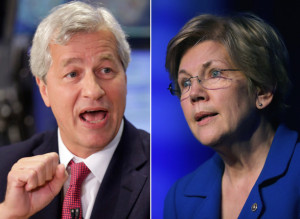 There are few people in Congress who criticize big Wall Street banks more than Sen. Elizabeth Warren (D-Mass.) does. A former Harvard bankruptcy law professor, she is the architect of the Consumer Financial Protection Bureau and chaired the government panel that oversaw the Troubled Asset Relief Program, which bailed out the financial sector in 2008.
There are few people in Congress who criticize big Wall Street banks more than Sen. Elizabeth Warren (D-Mass.) does. A former Harvard bankruptcy law professor, she is the architect of the Consumer Financial Protection Bureau and chaired the government panel that oversaw the Troubled Asset Relief Program, which bailed out the financial sector in 2008.
But according to JPMorgan CEO Jamie Dimon, she really doesn't know what she's talking about.
"I don’t know if she fully understands the global banking system," Dimon said on Wednesday at The Executives' Club of Chicago luncheon, according to Bloomberg.
Dimon did acknowledge that Warren and other critics have some "legitimate" concerns, and said that he'd be happy to meet with her.
Warren, a member of the Senate Banking Committee, declined to comment. But she has long been criticized by Wall Street for, allegedly, not knowing what she's talking about. In an April speech for the "Know Your Value" conference, Warren talked about the male-dominated culture of finance and the attempts to marginalize her:
I was in Washington in those months after the [financial] crisis, but I wasn't one of the guys. I hadn't worked for a Wall Street bank. I didn't play golf with the CEOs. I hadn't smoked cigars at the club. Nobody talked about this during my time at the congressional oversight panel. But over the life of that panel, 10 different people served on the panel: nine guys, one woman -- me. Not many people thought about it or noticed it because this kind of imbalance is so pervasive across finance.In 2012, women made up 54 percent of the financial services workforce, but they made up only 16 percent of the senior executives. And how about the corner office? None. Not one of the CEOs was a woman. That's not an accident, that's a culture.The finance guys argue that if you're never in the club, you can't understand it. But I think they have it backwards. Not being in the club means not drinking the Kool-Aid. Yeah, most of the finance guys were smart. But no smarter than a lot of other people I knew -- men and women -- who did a lot of other kinds of work. ...The problem was never that I didn't understand what the finance guys were doing. The problem was that I understood exactly what the finance guys were doing. I knew it, and they knew it.
Dimon and Warren have long been adversaries. In her 2014 book, A Fighting Chance, Warren describes a meeting between the two that grew "heated" and, for her, defines the tension at work.
Original ArticleWhen the conversation turned to financial regulation and Dimon began complaining about all the burdensome rules his bank had to follow, I finally interrupted. I was polite, but definite. No, I didn’t think the biggest banks were overregulated. In fact, I couldn’t believe he was complaining about regulatory constraints less than a year after his bank had lost billions in the infamous London Whale high-risk trading episode. I said I thought the banks were still taking on too much risk and that they seemed to believe the taxpayers would bail them out -- again -- if something went wrong.Our exchange heated up quickly. By the time we got to the Consumer Financial Protection Bureau, we weren’t quite shouting, but we were definitely raising our voices. At this point -- early in 2013 -- Rich Cordray was still serving as director of the consumer agency under a recess appointment; he hadn’t yet been confirmed by the Senate, which meant that the agency was vulnerable to legal challenges over its work. Dimon told me what he thought it would take to get Congress to confirm a director, terms that included gutting the agency’s power to regulate banks like his. By this point I was furious. Dodd-Frank had created default provisions that would automatically go into effect if there was no confirmed director, and his bank was almost certainly not in compliance with those rules. I told him that if that happened, “I think you guys are breaking the law.”Suddenly Dimon got quiet. He leaned back and slowly smiled. “So hit me with a fine. We can afford it.”
Source: huffingtonpost.com/
Author: Amanda Terkel, Ryan Grim
No comments:
Post a Comment